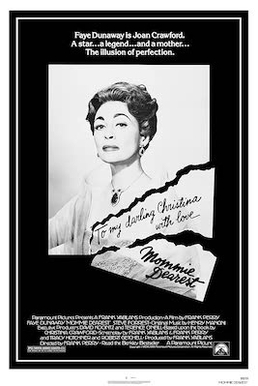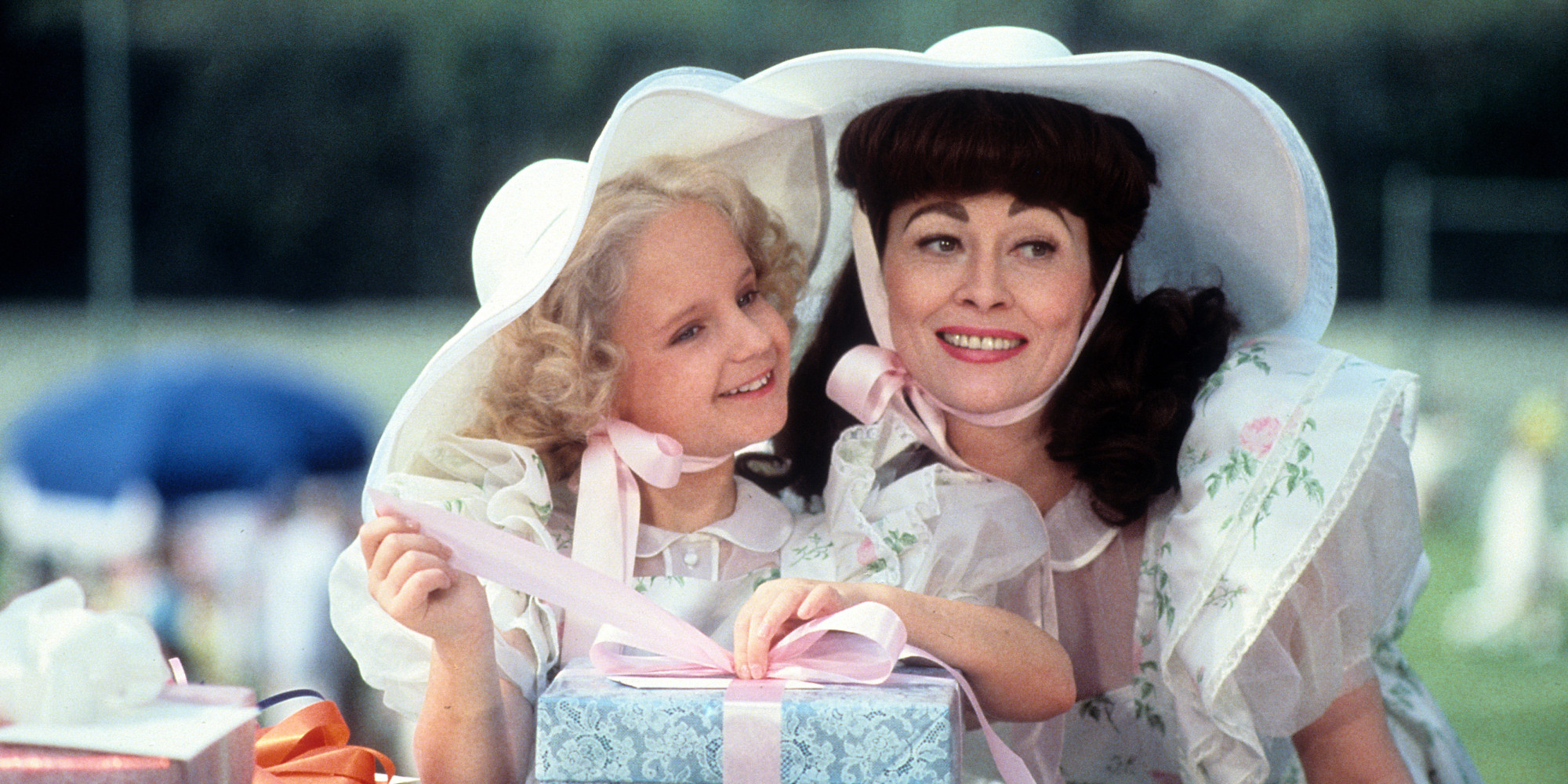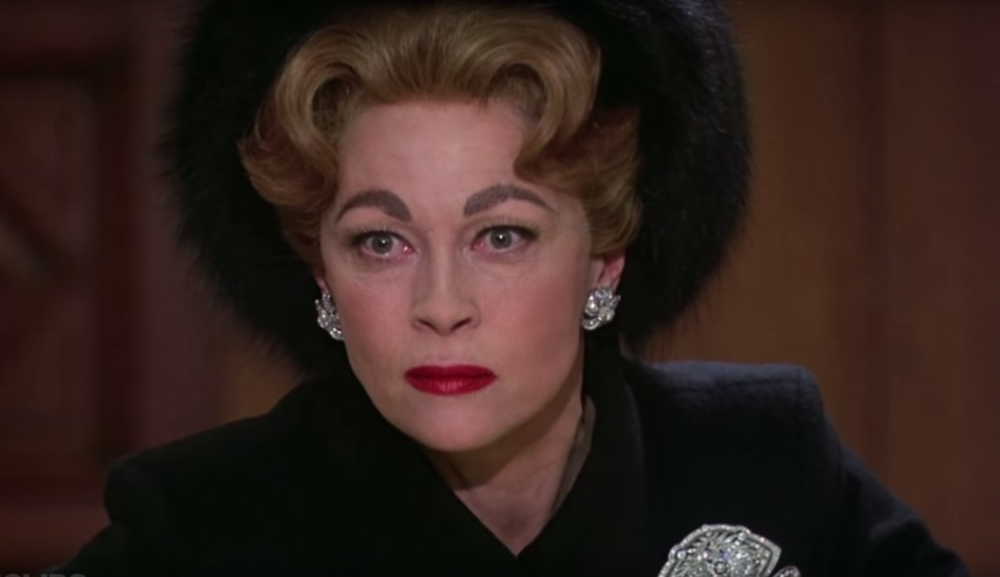MOMMIE DEAREST
Mama She's Crazy...
It is curious that Mommie Dearest was done with total sincerity; there was no desire or intention in making the film version of Christina Crawford's shocking autobiography anything other than a straight, serious drama. This tale of brutal physical and emotional abuse at the hands of Christina's mother, Oscar-winning actress Joan Crawford, was meant to be a searing drama, a cautionary tale.
It's curious therefore, because the end result isn't a somber tale of a woman's brutality against her own child, but a camp cult film about a deranged drag queen. At least that is the perception nowadays, with some truly bizarre moments now the object of mockery and parody. Like Cleopatra, I think people are no longer seeing the forest for the trees, and when they think of Mommie Dearest, they aren't actually thinking of the film itself, but of the parodies and the perceptions the film has fostered.
Granted, some of the moments in Mommie Dearest are rather outrageous (and those are the ones that have earned it the reputation as a disaster) but within the film itself there are good things (and even some good acting). Mommie Dearest is a case study of how a story veered so far out that it ended up being the opposite of its maker's intent: instead of a serious drama, it became a comedy.
Joan Crawford (Faye Dunaway) appears to have everything she has ever wanted: fame, a career as an actress and star, a handsome man at her beck and call. However, she is missing something, and that is a child. Thanks to her lover/lawyer Greg (Steve Forrest) she manages, despite being a twice-divorced actress, to gain a daughter.
Christina (Mara Hobel as a child, Diana Scarwid as an adult) appears at first to live a life of sumptuous wealth, but as time goes on the relationship between Christina and Joan becomes a hellish one. Joan verbally berates her daughter, and then graduates to physically abusing her (of which we'll talk about in more detail later). Eventually Joan sends Christina first to a boarding school, then after a romantic incident at the school sends Joan into yet another tirade, to a convent school.
Joan finds love with Pepsi-Cola Chairman Al Steele (Harry Goz). Christina has an acting career of her own, appearing in a soap opera, but when she gets a benign tumor Joan steps in for her daughter (even though she is far too old to play Christina's part with any degree of believably). Finally, Joan Crawford dies, with apparently only her ever-faithful gopher Carol Ann (Rutanya Alda) with her. When Christina and her other adopted brother Christopher learn they have been disinherited "for reasons that are well known to them", Christopher remarks that as always Mother has the last word. Christina, pensive, asks, "Does she?"
As it stands, no one save Christina and Joan Crawford will ever truly know what the truth is, and the fact that the defendant is dead does not clear up matters. The accuracy of Mommie Dearest is still a subject of fierce debate within the Crawford family itself (Christina's two other adopted sisters are adamant that there was no abuse), and this is not the place to argue one way or the other.
The film itself makes some terrible mistakes, chief among them by not putting anything in any kind of context. The Three Infamous Moments in Mommie Dearest just erupt with barely any idea of where the fury Crawford had came from. Moreover, they are filmed by director Frank Perry in such a way that they all but dare us not to laugh at the sheer lunacy of it all.
Let's take Infamous Moment Num. 1: The Rose Garden scene. In the scene earlier, Joan had just been effectively fired from Metro-Goldwyn-Mayer by her boss, Louis B. Meyer (Howard Da Silva). How does she react to this devastating news? Side note: the scene between Crawford and Meyer never establishes if the parting was hurtful to Meyer or not: Da Silva bouncing between looking satisfied to get rid of 'box office poison' and looking as though he were about to burst into tears at seeing her go.
Well, here's how I've reacted to being fired (of which I can count more times than I care to): have a good cry, get drunk, do cartwheels, eat too much, go to the movies, go to bed for a few days, or wake up and go straight to the unemployment office (though no, not all in one day). Here's how Crawford reacted: she put on an elegant evening gown and in a fit of fury started demolishing her rose garden with gardening shears, then gets Carol Ann to wake the children (they must have been heavy sleepers to not hear her screaming about being 'Hollywood royalty' and 'box office poison' and 'creative differences') and have them start picking up the dismembered roses. Finally, she screams at her daughter one of the most notorious and parodied lines in Mommie Dearest, "TINA! Bring me the ax", at which point a terrified Christina brings her the ax. Joan then chops down a tree.
The whole scene is just patently psychotic, and in a bizarre way, is reminiscent of a Joan Crawford film. In Strait-Jacket, Joan played an ax-wielding murderess who after being released from the booby hatch (producer William Castle's terminology, not mine) she becomes the prime suspect in a series of ax murders. The imagery of Crawford wielding an ax in a moment of insanity appears far too similar for it to be a mere coincidence (it may have been, but when one has seen Strait-Jacket one can't help think that perhaps subconsciously or overtly the filmmakers drew inspiration from the film in the Rose Garden scene).
Infamous Moment Num. 2 is perhaps the most infamous moment in the film itself if not one of the most notorious in film history: the Wire Hanger scene. A whole essay could be done to catalog why this particular sequence went so far into comedy and camp, but we'll try to hit the low-lights. The entire sequence starts to go off the rails almost instantly when we see Dunaway/Crawford in heavy face cream but curiously, with full red lipstick. It has the unintended consequence of making Dunaway/Crawford look like a clown: a psychotic clown, but a clown nonetheless.
If that didn't make the scene already downright insane, Dunaway's performance here becomes something that leaves viewers stunned. It is true: in this scene Faye Dunaway transcended screen acting and slipped into Kabuki theater: the make-up, the sumo-style squatting she did before lunging at Christina and the audience, the wild overacting. When we're suppose to be horrified by a woman beating a child mercilessly with a wire hanger and then a cleaning powder container, the performance is just so out of control that we end up laughing hysterically.
It is reminiscent of what Oscar Wilde said about Charles Dickens' The Old Curiousity Shop: anyone who does not laught at the death of Little Nell would have to have a heart of stone. In the same vein, anyone who doesn't laugh at the brutalizing of Christina Crawford has no sense of humor. Dunaway was not pulled back from going into borderline mania by Perry, and Hobol's protests of innocence and terror only seem to add to the lunacy of the scene, even to the comedy. In short, Dunaway as Crawford looks comically deranged, almost clownlike in her fury over wire hangers.
As if to conclude this singular moment of screen infamy, after Crawford screams at Christina to "CLEAN UP THIS MESSSSSS!" and Christina asks how, Crawford just tells her, "Figure out for yourself", then ends her screen presence by crossing her eyes! Yes, if you examine the scene, Faye Dunaway punctuated this bizarre and outrageously funny scene by crossing her eyes! With that clownish face cream make-up? How can one not be howling with laughter at that? Finally, little Christopher finally appears, telling his sister he'll help her clean up. No, he's told. She (Crawford) will kill them if she found out, he's told. With that, little Christopher walks away quite calmly, as if he hadn't heard his mother lose her mind. It just adds a coda of comedy and craziness to what we've all seen.
Then there is Infamous Moment Num. 3: the Strangulation Scene. Christina, now an adult, has been dragged out of Chadwick School after being caught with a boy in the stables. Joan's rage is palpable as she tries to continue an interview for a magazine. When Christina dares to contradict Joan's version of events, she takes her into the living room, where upon the mother slaps her daughter, then after being told by Christina that she is "not one of her FANS!" Joan Crawford then lunges at Christina and begins to strangle her, plowing straight into a glass table as the elder attempts to murder the younger. Again, this moment should be one total shock and horror, but the way it was shot (including a shot that shows Christina's panties) people will only end up screaming with laughter.
As I studied Mommie Dearest, I can pinpoint the common denominator in each of these Infamous Moments: in each of them, Joan Crawford is totally deranged, if not downright psychotic. When Crawford is reasonable, even when she's harsh but still within the bounds of comprehensible behavior, Mommie Dearest appears to try to chronicle a tortured mother-daughter relationship. It's only when Dunaway is either directed badly or not directed at all (perhaps that's not entirely true: she may have been told to let herself go) and allowed to go into fits of insanity that Mommie Dearest goes wildly wrong.
There was a moment when Mommie Dearest pulled itself together to present something bordering a drama. It is a scene where Joan and Christina are in the laundry room. Joan tells her daughter that she's had to make several cutbacks, and that Christina will have to be on a work scholarship to stay at Chadwick. Joan then allows herself to be vulnerable, tearfully telling her daughter that she lost her contract at Warner Brothers, confessing her fears about not having a job or studio or money. IF there had been more moments like these in Mommie Dearest, where Dunaway is featured as the strong actress that she is and allowed Crawford to appear as horror of horrors, human, Mommie Dearest could have been a deeper film. However, by this time the wire hangers had already come out, and it far too late into the film to have rescued the project.
One thing that I think was a major contributor to the failure of Mommie Dearest is something I long have warned about: the gluttony of hands on the script. Robert Getchell, Tracy Hotchner, director Perry and producer Frank Yablans all co-wrote the script. It's amazing that four people could have taken Christina Crawford's book, which is actually more shocking and grounded than the film version, and turned a rather straightforward story into a chaotic and jumbled mess. Having read the tell-all, I can add details that the film appears uninterested in.
For example, the Chadwicks (Colonel and Mrs. Chadwick) played an important role in Christina's life, serving as surrogate parents and protectors to her. Her forced parting from them is quite painful. In the film, Mrs. Chadwick appears only twice: when the child Christina is dumped at the school and when the adult Christina is dragged out. Whatever connection there was between Mrs. Chadwick and Christina is lost amid the hysterics the filmmakers appeared to think were more important.
Another moment is when Christina is sent to convent school. Again, the book is more detailed about her experiences there, but in Mommie Dearest, she is at the Mother Superior's office, and less than two minutes later, she is leaving. Therein lies a major problem in Mommie Dearest: we are never given any reason for anything that we see. We never understand why wire hangers send Joan Crawford into a psychotic episode. We only are presented with the scene where a woman goes Berserk! (pun intended) but just showing us Crawford's insanity doesn't give us an insight as to why she went Berserk! (pun intended).
You can't show us these insane moments and expect us to just accept them as realistic because we never are given any context as to what leads into them. By the end of Mommie Dearest, major characters jump in and out so quickly we never get a hold of what their presence means in terms of the actual story. Al Steele doesn't take more than ten minutes before he dies off-screen. Did Crawford truly love him?
Outside sources such as the documentary Joan Crawford: The Ultimate Movie Star, indicate that she did, even keeping his box of cereal and his bowl in a cupboard even though she didn't eat cereal in bed like he did, removing them being too painful for her. However, like many things in Mommie Dearest, they are sped through, while the moments of insanity (the rose garden, the wire hangers) is given much screen time.
As a side note, while watching Mommie Dearest (including more bizarre moments like Joan tearing at Christina's hair because she thought Christina was making fun of her or removing her dolls because, like Christina and Christopher, they had been 'thoughtless and selfish') I started wondering about Joan Crawford. I began sincerely wondering whether Joan Crawford was developing some kind of mental illness that appeared to grow stronger as time went by: going from merely shouting at her children and tearing at roses to beating and then culminating attempting to murder her children.
It appeared that Crawford wasn't evil, but just becoming more and more mentally ill, with her drinking problem only aggravating things. As a result, I think voting Joan Crawford in Mommie Dearest as one of the American Film Institute's 100 Greatest Villains of All Time is not just inaccurate but downright vicious.
I digress to put in my own view of Joan Crawford. It may be that the biggest tragedy involving Mommie Dearest is the damage Crawford's reputation has suffered, perhaps irreversible. Now people may not see that Crawford was a strong actress and gave some wonderful performances even in really second-rate films like Strait-Jacket and Berserk!. Instead, she may be remembered not for her work but for wire hangers, which probably would have horrified/infuriated/hurt her: that her work, which she valued more than anything, has been diminished by her off-screen behavior which may not even be true.
Now, both Hobol and Scarwid manage to give strong performances as the deeply tormented Christina. As much as Dunaway has disassociated herself from Mommie Dearest, she actually became Joan Crawford. She transformed herself not just physically (the transformation is so remarkable that one could easily mistake Dunaway for Crawford) but she gives Joan Crawford the intensity to which she approached her career (including doing a good version of Crawford's Oscar-winning turn in Mildred Pierce). It's only in those moments of insanity that Dunaway appears to rely only on her own direction, and it's those moments when external factors (the script, the make-up: which I understand was Dunaway's idea) derail her performance.
Compliments also should go to Henry Mancini's remarkably elegant and sad score which in another version of the film could have been poetic but serves to make the juxtaposition of the sincere and the insane all the more pronounced. Even Frank Perry started out Mommie Dearest well with a good opening: giving us so much detail about Joan Crawford but not revealing her face until the end of the scene, where we see just how convincing Faye Dunaway was in the role. Sadly, it all went downhill from there.
Even though in retrospect Mommie Dearest is in so many ways a film that goes wildly wrong and veers off from its intended purpose, there is something hypnotizing about it, especially in how Dunaway commits totally to being Joan Crawford. On a personal note, I am aware of the flaws Mommie Dearest has, but I think it's a good film, even entertaining albeit for the wrong reasons. Every time I watch the Wire Hanger scene, as much as I try to sympathize for the brutality on screen, I can't help but just collapse into total laughter at how committed everyone appears to be in trying to be serious when it keeps going more and more into camp.
In the end, Mommie Dearest is not a perfect film, and perhaps not even a good film. It is, however, a most fascinating one, the perfect anti-Mother's Day film. Just, don't tell Mama...
 |
| 1904-1977 |
DECISION: B-







No comments:
Post a Comment
Views are always welcome, but I would ask that no vulgarity be used. Any posts that contain foul language or are bigoted in any way will not be posted.
Thank you.